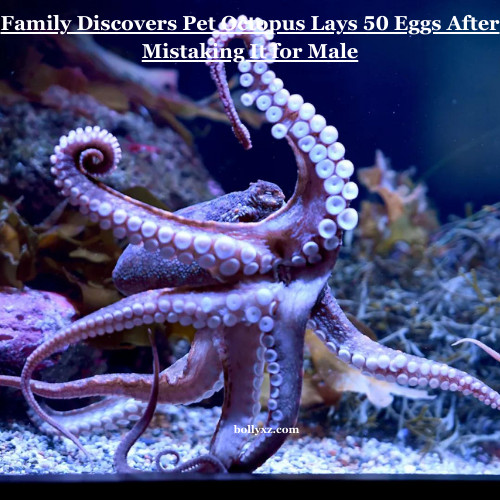An Oklahoma family who had accidentally bought a pet octopus ended up with dozens of the sea creatures on their hands, after an unexpected childhood growth spurt. Their pet turned out to harbour fertilized eggs, leaving the family with 50 unexpected baby octopuses.
Cameron Clifford’s nine-year-old son, Cal, had been asking for a pet octopus for years. Clifford told USA Today’s Charles Trepany that Cal has asked for an octopus for every birthday, Christmas, and first trip since he was two years old. He has done tricks and stunts as an octopus and has had octopus-themed birthday parties.
Octopus ended up with dozens of the sea creatures
“We want to inspire our children’s interests,” Clifford tells Anita Snow of the Associated Press (AP). “It’s magical to see a child embrace their dreams and make them come true. Cal has been in love with the natural world and marine biology since he was very young.”
Clifford finally gave in to his son’s pleas last year and purchased a California octopus. In a video posted to TikTok, Clifford filmed Cal as he showed him an aquarium he had purchased to keep the family’s future pup. The surprise moved Cal to tears. “You didn’t have to do that,” she sobs in the video.
The family properly calibrated the tank’s water before the octopus came to live with them, as the species is very sensitive to poor water quality. Last fall, when Cal turned nine, the octopus, which he immediately named Terrance, arrived at the house via shipment to the United States, swimming in a bag of water packaged inside a cardboard container. At first, the Cliffords thought Terrance would be male, but they were wrong when the eggs appeared, writes María Luisa Paúl of the Washington Post.
California two-spotted octopuses reach mating age between 1 and 2 years old, and while they can reproduce at any time of year, they typically mate when temperatures are warmer in the summer, according to California Sea Grant.
Octopuses only mate once in their lifetime — the male dies quickly after inseminating the female, and the female typically dies of starvation or exhaustion while nesting. While caring for her eggs, a female octopus stops eating and self-mutilates.
Experts told the Cliffords that Terrance’s eggs could not be fertilized, and the family hand-fed her while covering what they thought were eggs that might never hatch, according to USA Today. One night, though, while Clifford was cleaning the tank, something normal happened when she picked up one of the eggs. “I popped it by accident and a blob came out that extended these little tentacles and did three strokes around my vantage point,” Clifford tells Michael Levenson of the New York Times. “It was really impressive.”
Before the animal was caught by a diver off the coast of California, it had bred with another octopus. The eggs were introduced late, because female octopuses can put off releasing their eggs until they feel safe, according to the Washington Post. The animal has a gestation period of 150 to 210 days, according to California Sea Grant.
When each of Terrance’s 50 eggs hatched, Clifford rushed to care for the hatchlings. She gave each one an individual box, to keep them from eating each other, and spent a ton of dollars each week on food. In total, Clifford estimates she has spent between $3,000 and $4,000 on the octopuses in the past year, according to the Washington Post.
Experts warn that the public should not keep octopuses as pets.
“They don’t belong in human homes, period,” Barbara J. King, an anthropologist at William & Mary, tells the New York Times.
Paul Clarkson, director of breeding operations at the Monterey Bay Aquarium in California, may have doubts about the welfare of any octopus raised in a private home, he tells the Washington Post. But what the Cliffords have done is “pretty astonishing,” he adds.
Of the original 50 babies, 23 are still alive, according to the Washington Post. A family friend and reptile scientist has helped care for the young octopuses. Regardless of usual care, few octopuses have a chance of survival, Angelina Komatovich, a marine biologist at Orange Coast University, tells NPR’s Jordan-Marie Smith and Sarah Handel. “You would expect only one of them to survive to adulthood in an aquarium subjected to ideal conditions,” she tells the book.
Now, Clifford is working with aquariums and researchers who might be willing to take on some of the surviving young octopuses. And Terrance? She’s still alive, even four months after giving birth, according to the AP.

